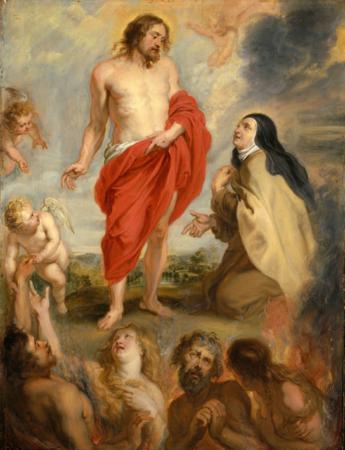
Spirituality
... if we are to see it as it is, that is, think it true when it is true, we need to enlist the help of imagination. Purgatory is a reality, not a pious story!

Pakaluk
We need to imagine something well, to think it true. That tiny twinkling light-dot in the sky? "It is a sun. Picture it many millions of miles away, burning bright like our own sun, and how powerful is its light, and how clear space must be, that its light even gets here at all, and that, when it does, it is so focused, a clear point, not a diffuse little ball!" Now can you picture a star? Now do you believe it? This is how parents used to speak to their children, to teach them. And when they could picture things clearly, children didn't grow up to be relativists.
Poetry presents truths to us in pictures as well. "I caught this morning morning's minion, king-/ dom of daylight's dauphin, dapple-dawn-drawn Falcon." "It is the blight man was born for,/ It is Margaret you mourn for." "All things counter, original, spare, strange;/ Whatever is fickle, freckled (who knows how?)/ With swift, slow; sweet, sour; adazzle, dim; /He fathers-forth whose beauty is past change:/Praise him." That last is a picturing, if it were possible, of a changeless source of change, philosophy's Unmoved Mover.
The life of Christ was pictured too. No early Christian wrote a treatise. Rather, they wrote Gospels, which give us pictures of truths. These pictures, in words, Our Lord called parables. Pictures in deeds we refer to as miracles. Curing the blind? That's not about blindness. Blindness pictures ignorance and sin. Feeding the multitudes? It's not about the food. It's a picture of the Eucharist.
So, in the month of November, when the Church asks us to focus our thoughts and prayers on the "Church Expectant" (Ecclesia expectans), or "Church Penitent," (Ecclesia poenitens) -- that is, the souls of our brothers and sisters in Purgatory -- if we are to see it as it is, that is, think it true when it is true, we need to enlist the help of imagination. Purgatory is a reality, not a pious story!
There are some good books which are very vivid, such as Tan's famous "Purgatory: Explained in the Lives and Legends of the Saints," which has inspired, and frightened, more than one Christian to live according to a higher standard of virtue.
But if we want to revive our imagination, and are looking for a poem to do the trick, we could do no better than Blessed John Henry Newman's "Dream of Gerontius." It is easy to get, in the public domain at NewmanReader.org. It is easy too, to download and take to prayer. We can even listen it, set to music by Edward Elgar in his great oratorio by the same name.
Gerontius, "elderly man" in Latin, stands for any of us. The poem opens with him on his deathbed, surrounded by a priest and relatives, praying last rites over him. If you have ever kept watch by a deathbed, you will recognize in Newman's writing great truthfulness and pity.
Gerontius passes through death, "I can no more; for now it comes again,/ That sense of ruin, which is worse than pain." Newman's description of what it feels like for a soul to live on, free from the body, is wonderful and convincing. As Catholic doctrine states, although his soul no longer has a body, it is still oriented to a body, and continues as only a partial thing without the body: "Am I alive or dead? I am not dead,/ But in the body still; for I possess/ A sort of confidence which clings to me,/ That each particular organ holds its place." Yet, "'Tis strange; I cannot stir a hand or foot,/ I cannot make my fingers or my lips/ By mutual pressure witness each to each."
Then the Guardian Angel of Gerontius approaches him, to lead him to the throne of God, for judgment. As he does so, he celebrates the human nature of the soul in his charge. These are some of the greatest lines in poetry, beginning, "O Lord, how wonderful in depth and height, But most in man, how wonderful Thou art!"
The angel leads Gerontius through a pack of menacing devils, and then into the upper reaches of heaven, where ever higher ranks of "Choirs of Angelicals" are heard singing hymns. The Fifth and highest Choir's song provides the words for that famous hymn, ''Praise to the Holiest,'' including the stanza: "O generous love! That He who smote/ In man for man the foe,/ The double agony in man/ For man should undergo."
The soul almost gets to the very feet of Emmanuel, but "ere it reach them, the keen sanctity,/ Which with its effluence, like a glory, clothes/ And circles round the Crucified, has seized,/ And scorch'd, and shrivell'd it." The soul pleads to be led away, "to the lowest depth," to recover and be healed. This is purgatory: "There will I sing, and soothe my stricken breast,/ Which ne'er can cease/ To throb, and pine, and languish, till possest/ Of its Sole Peace."
The poem ends with a hymn sung by the Souls in Purgatory, as the Guardian Angel gently lowers his charge into the "penal waters," saying, "Farewell, but not for ever! Brother dear,/ Be brave and patient on thy bed of sorrow;/ Swiftly shall pass thy night of trial here, And I will come and wake thee on the morrow."
Requiem aeternam dona eis, Domine. Et lux perpetua luceat eis. Amen.
- Michael Pakaluk is Professor of Ethics and Social Philosophy in the Busch School of Business at The Catholic University of America. His book on the gospel of Mark, ‘‘The Memoirs of St. Peter,’’ is available from Regnery Gateway.
Recent articles in the Spirituality section
-
No line-drawingMichael Pakaluk
-
Physician-assisted suicide is a slippery slopeCardinal Seán P. O’Malley
-
He saw the cloths and believedBishop Robert Barron
-
God's instrument for viewing the crucifixionMichael Pakaluk
-
QuinquagesimaMichael Pakaluk


















